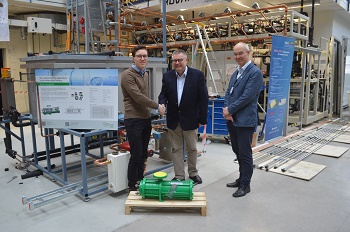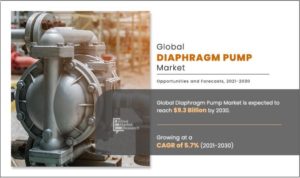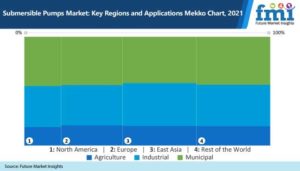Hermetic Donates Hermetically Sealed CO2 Refrigerant Pump for Research

From left to right: Håkon Selvnes, NTNU/ Torsten Brodersen, FINISTERRA/ Armin Hafner, NTNU during the handover of the refrigerant pump at the Institute of NTNU in Norway (Image source: HERMETIC-Pumpen GmbH)
The canned motor pump designed specifically for CO2 applications is being used in a pilot plant that is researching thermal energy storage using phase change materials in industrial CO2 refrigeration systems.
The aim is to reduce peak loads to enable system downsizing. The resulting benefits are a significant reduction in capital investment costs and ongoing energy costs of the overall system.
As part of environmental and climate protection, industrial refrigeration technology is increasingly demanding solutions that reduce direct emissions of refrigerants as well as overall energy consumption. As a result, the significance of CO2 (R744) as a refrigerant has also increased rapidly in plant engineering. The reason: CO2 is a natural refrigerant and environmentally friendly and cost-effective compared to the fluorinated refrigerants. CO2 is colourless, non-toxic and non-flammable.
Research project: Phase change material in industrial CO2 refrigeration systems
To reduce the energy consumption of industrial CO2 refrigeration systems, the Energy and Process Engineering Department of NTNU in Trondheim is testing a new thermal energy storage system. The research project investigates the extent to which thermal energy can be stored at low load times in phase change materials (PCM) - also known as phase change storage or latent storage – for reuse during peak loads. Added heat accumulators should reduce the load peaks. This allows the system to be designed for a lower load level contributing to system downsizing. In this way, it is possible to significantly reduce both the acquisition costs and the ongoing energy costs of the overall system. Particularly huge potential for this technology exists in plants that have major differences in the cooling demand during the day, such as in cooling processes in the food industry. Benefits on the plant side include smaller pipe dimensions, low energy consumption for pump circulation, small pressure drop and efficient heat transfer.
High demands on the components used
A distinctive feature of CO2 is its critical point of 31°C that requires much higher pressures for heat dissipation than are normally used in industrial cooling. This places special demands on the components used. In the pilot plant, the refrigerant CO2 circulates in a temperature range from 5°C to -50°C with a maximum nominal pressure of 52 bar. For pump technology, it is particularly important to control the high pressure of the pumped medium. Even at normal operating temperatures, CO2 also has a low viscosity that continues to drop as the temperature rises. This has a negative effect on the carrying capacity of the plain bearings. Other points are the required absolute tightness and a low MTBF value both demanding the highest reliability of the pump used.
Hermetic refrigerant pump specifically designed for CO2 applications
For the pilot plant, Hermetic-Pumpen GmbH together with its Norwegian agent Finesterra AS supplies a multi-stage canned motor pump of the type CAMh specifically designed for CO2 applications. This series has been developed to meet the requirements of operation at 52 bar and standstill pressure. The generously dimensioned plain bearings made of state-of-the-art sintered materials ensure contact-free and thus virtually wear-free operation of the pump. The construction and material choice of the pump series cover the nominal pressure PN 52 reliably. A pressure test at 78 bar is carried out on each pump according to valid standards such as ISO 15783 for canned motor pumps. In addition, the secondary safety containment is tested for leak-tightness using nitrogen (N2). In this way, the Hermetic pump ensures a reliable and controlled flow of the refrigerant in the pilot plant.
Hermetic-Pumpen GmbH is committed to research and development
Adrian Schäfer, Product Manager for Refrigerant Pumps says: "Hermetic pumps have advanced technologies that made us a world market leader. This is not possible without continuous investment in research, development and manufacturing. It is therefore our aim to support research at universities as well. We are interested particularly in research fields that focus on environmental protection and energy efficiency. We wish the research team every success."
About NTNU – Norwegian University of Science and Technology
NTNU is the largest university in Norway, with an international focus, headquarters in Trondheim and campuses in Ålesund and Gjøvik. NTNU has its main profile in science and technology and, with a total of nine faculties, offers a variety of study programmes and a broad academic spectrum for around 42,000 students. Two researchers working at NTNU have received Nobel Prizes: May-Britt Moser and Edvard Moser (2014). In addition, the laureates Ivar Giæver (1973) and Lars Onsager (1968) were trained at the Norwegian Institute of Technology (NTH), one of NTNU s predecessors.
Source: Hermetic-Pumpen GmbH




